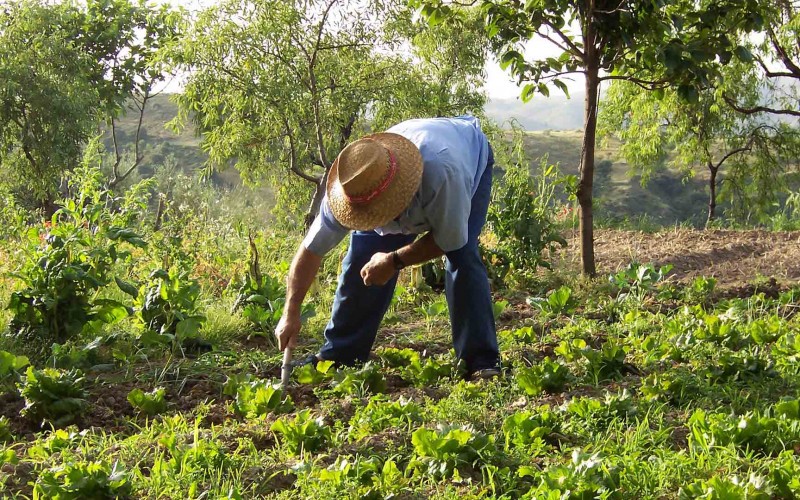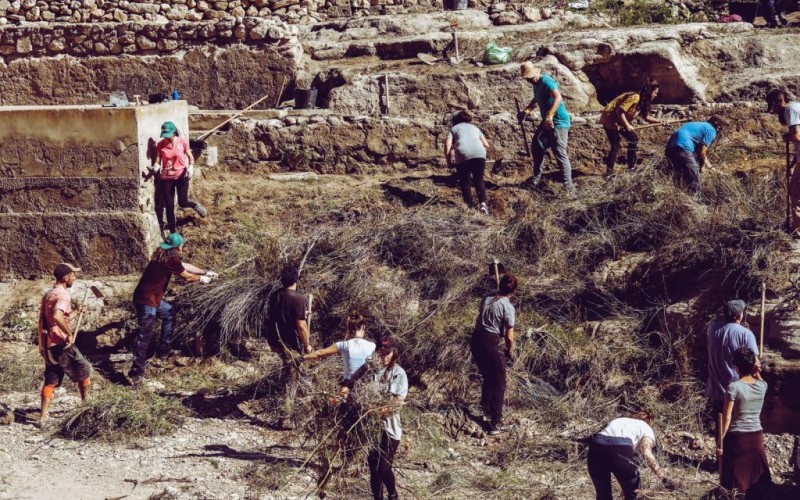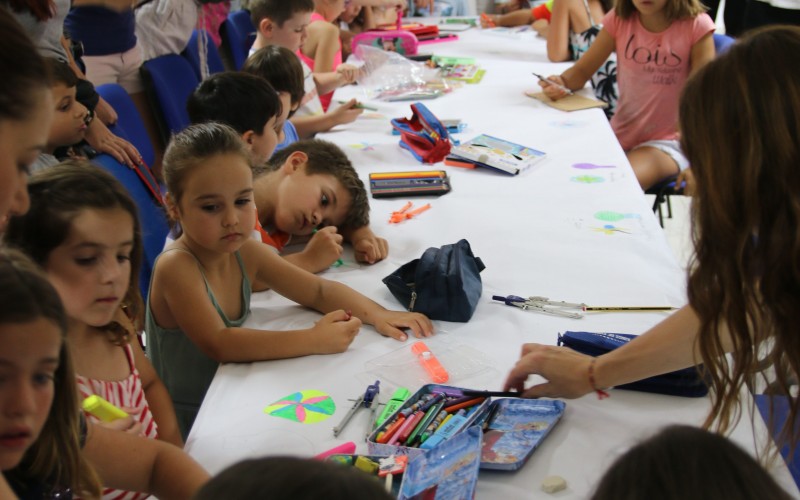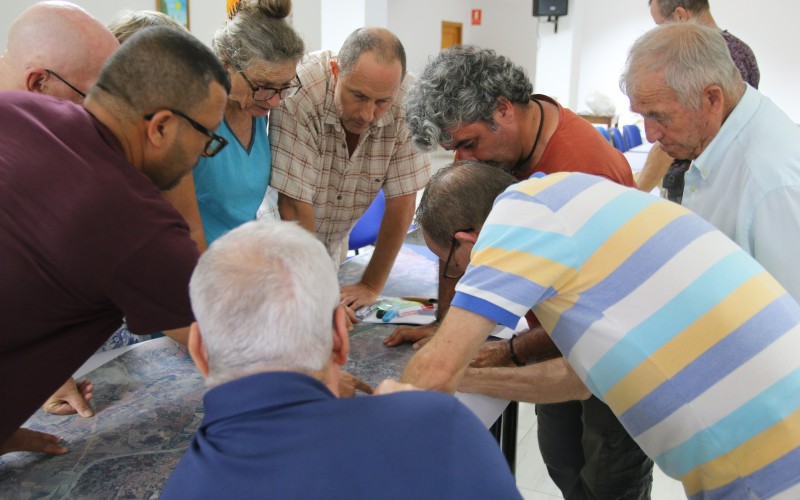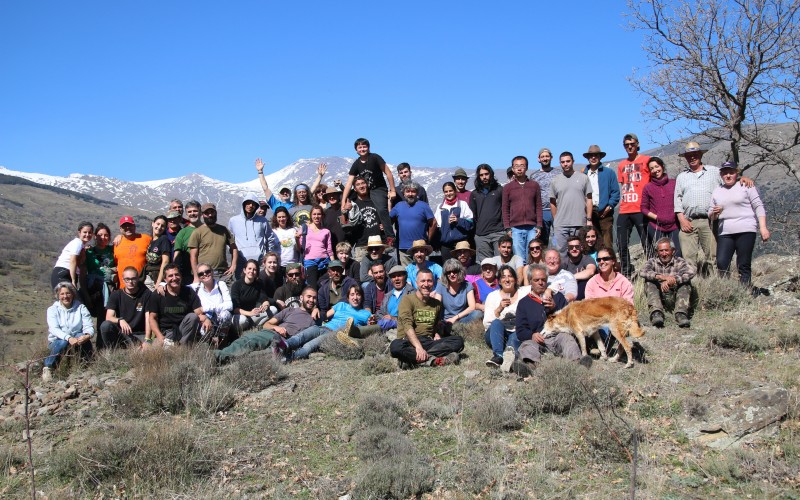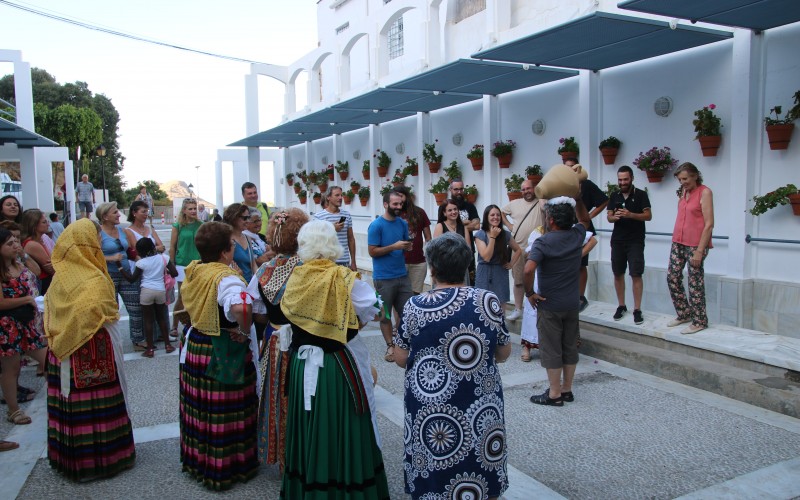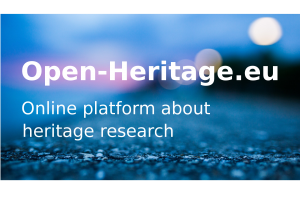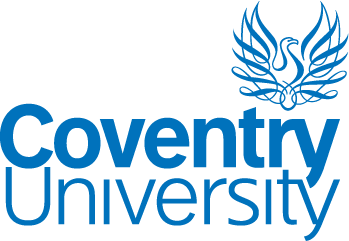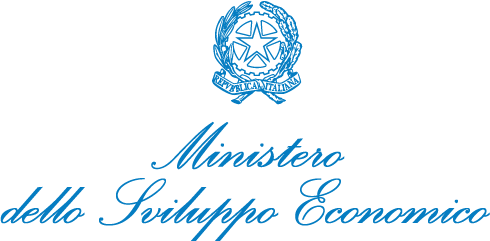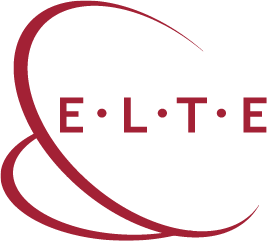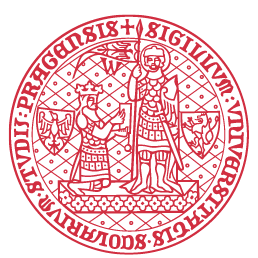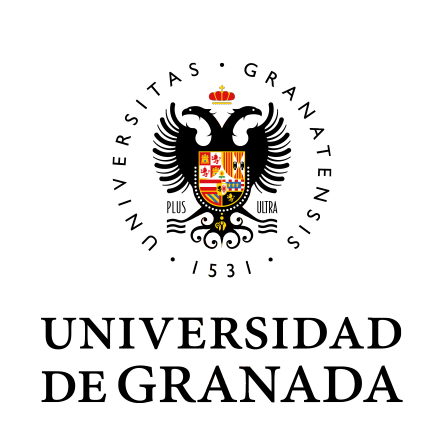Spain
Task Leader: UGR (ES)
This pilot has examined participatory approaches in cultural and environmentally protected areas as a means of resolving conflicts between preservation, (re-)use and economic activities (such as tourism). While its main focus has been on Sierra Nevada (ES), an important protected area as UNESCO Biosphere Reserve and National Park, the pilot’s findings are also supported by two case studies from Italy (Ticino Park and Norcia). Throughout all its case studies, the pilot intended to reinforce social participation of local communities as the best strategy to manage and preserve the heritage, cultural and environmental values of the landscapes in which these communities live and work.
Participatory approaches explored in Spain included on-going work with a variety of irrigator communities in the Sierra Nevada, Community Archaeology programmes in Mojácar la Vieja and transversal participatory activities via UGR’s MEMOLab. In addition, the pilot has also explored two case studies from Italy: the marcita meadow and highway project at Ticino Park, and post-earthquake recovery actions in Norcia and surrounding Apennines. In both Spain and Italy, the pilot has considered themes of communal resources, resilience and empowerment, heritage awareness of agrarian culture, and transmitting and benefitting from the past in the context of global and environmental change.
The pilot has been working with communities where traditional practices and knowledge are being abandoned. Communities are often threatened by change and uncertainty about the future, so the pilot has worked with them in a participatory manner to support improved organisation. Work has also been undertaken with city-based stakeholders and policy makers, making proposals to preserve and improve rural heritage. The pilot has recognised the need to organise policy-making for economic and social benefits, maintaining productive activity whilst preserving landscapes, as well as cultural, social and environmental values. In both contexts, intervention and mediation become the foci in order to overcome social conflicts and lead to social empowerment, sustainable economic development and cultural and social acknowledgement.
This pilot has explored participative mediation processes involving a range of local stakeholders: farmers and communities on the one hand, and administrative and institutional bodies on the other. The central issues are related to water and soil management and the use of other natural resources in order to preserve and safeguard the rural cultural heritage milieu. Co-governance and territorial safekeeping have been promoted to protect tangible and intangible agrarian heritage and rural landscapes. The implementation of co-governance initiatives has had a direct impact on reinforcing the resilience of this heritage, increasing its capacity to face current challenges, which are directly connected to global and climate change.
Further detail of the pilot can be found in D5.4 Rural heritage pilot results.
Events
- 15 February 2020, Sorbas, Almería (Spain). Participatory activity: cleanliness of Fuente de los Caños.
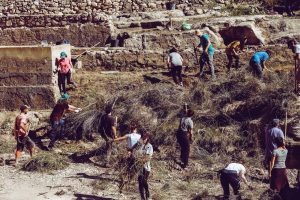 REACH project, MEMOLab and local associations has collaborate in the cleanliness of Fuente de los Caños, abandoned decades ago. Read more here.
REACH project, MEMOLab and local associations has collaborate in the cleanliness of Fuente de los Caños, abandoned decades ago. Read more here.
Fotography by E. Aramburu and R. Corselli.
- 15 October 2019, Granada (Spain). Briefing of the H2020 program entitled “Inclusive, Innovative and Reflective Societies”
 The event was organized by the Office of International Projects of the UGR and the Andalusian Knowledge Agency. Prof.José María Martín Civantos of the REACH Rural Heritage Pilot, participated in this briefing. Read more info here.
The event was organized by the Office of International Projects of the UGR and the Andalusian Knowledge Agency. Prof.José María Martín Civantos of the REACH Rural Heritage Pilot, participated in this briefing. Read more info here.
- 18 July 2019, Mojácar, Almería (Spain). Participatory map of historic irrigation systems
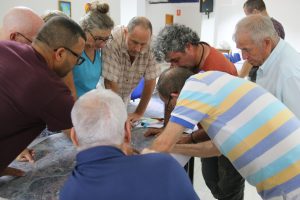 UGR organized a participatory map about historical irrigation systems in Mojácar with the local irrigators.
UGR organized a participatory map about historical irrigation systems in Mojácar with the local irrigators.
Link to the gallery
- 15 July 2019, Mojácar, Almería (Spain). Archaeological excavation with children
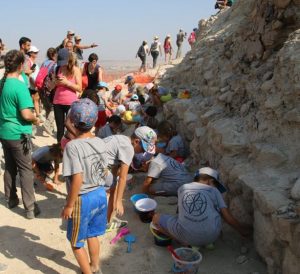 25 children were involved in the archaeological excavations of Mojácar
25 children were involved in the archaeological excavations of Mojácar
- 11 July 2019, Mojácar, Almería (Spain). Art session in the archaeological excavation of Mojácar
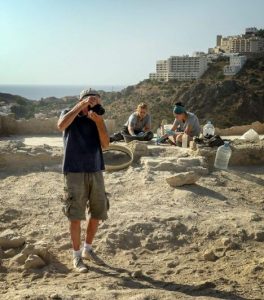 It was an artistic event during which local artists joined the archaeological excavation taking photos and notes (photographers, painted, sculptors..). The artistic production was exhibited in the town and in the Granada University.
It was an artistic event during which local artists joined the archaeological excavation taking photos and notes (photographers, painted, sculptors..). The artistic production was exhibited in the town and in the Granada University.
- 09 July 2019, Mojácar, Almería (Spain). Mojaquera Workshop.
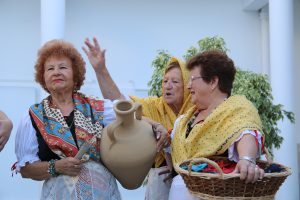 The women, in traditional dress, explained how the life was in the fountain and in Mojácar, how the fountain was before the restauration. The local community demands the recovery of the original fountain.
The women, in traditional dress, explained how the life was in the fountain and in Mojácar, how the fountain was before the restauration. The local community demands the recovery of the original fountain.
Link to the gallery
- 04 July 2019, Mojácar, Almería (Spain). Esparto Workshop.
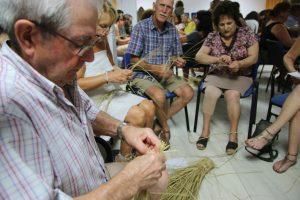 For the first time, 7 esparto craftsmen of Mojácar gathered in the village to teach the attendees their traditional job.
For the first time, 7 esparto craftsmen of Mojácar gathered in the village to teach the attendees their traditional job.
Link to the gallery
- 03 July 2019, Mojácar, Almería (Spain). Geometric drawings workshop
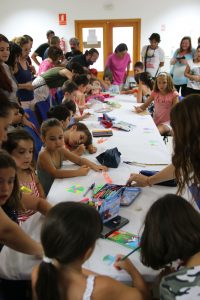 The geometric design is present in the local archaeological heritage; thirty boys and girls participated in the geometric drawings workshop.
The geometric design is present in the local archaeological heritage; thirty boys and girls participated in the geometric drawings workshop.
- 17, 30 March; 13, 14 April; 4, 5 May 2019, Spain. Recovery of historic irrigation channels.
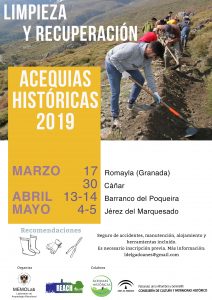
University of Granada, in collaboration with irrigators communities, organized the campaign "recovery of historic irrigation channels"
The first activity was held on Sunday 17th March with the collaboration of the Council of the Alhambra.
Read more here.
- 18 April 2019, Spain. "Granada La Bella" award from Oppidum Eleberis Granada.
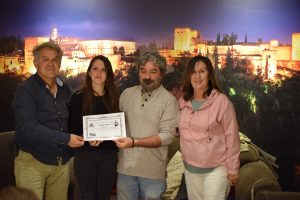 The MEMOLab laboratory received the "Granada La Bella" award from Oppidum Eleberis Granada for contributing to the conservation of Darro Valley and its historical heritage and values. In 2017-2018, in the framework of REACH project, several volunteers were involved in the recovery of "Romayla" and "Real de la Alhambra" medieval irrigation channels. Read more here.
The MEMOLab laboratory received the "Granada La Bella" award from Oppidum Eleberis Granada for contributing to the conservation of Darro Valley and its historical heritage and values. In 2017-2018, in the framework of REACH project, several volunteers were involved in the recovery of "Romayla" and "Real de la Alhambra" medieval irrigation channels. Read more here.
- 1 April 2019, Educational Activity with the High School of Mojácar (Almería, Spain).
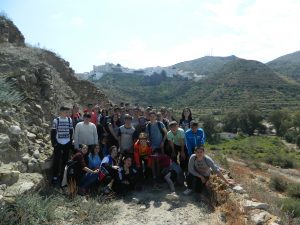 Dr. Delgado Anés talked and made a guide visit about the archaeological heritage from Mojácar to the high school students.
Dr. Delgado Anés talked and made a guide visit about the archaeological heritage from Mojácar to the high school students.
Link to photo gallery.
- 21, 28 October, 04 November 2018 Huétor Mountains, Granada (Spain)
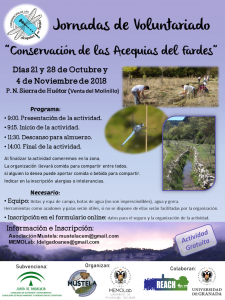
University of Granada organized with MUSTELA association a participatory activity based on the cleanness of Huétor Mountain Irrigation Channels.
- 18 October 2018, Mojacar, Spain. Presentation of the results of the archaeological excavationin in Mojacar (Almería-Spain) and the engagement of local communities in the rural heritage.
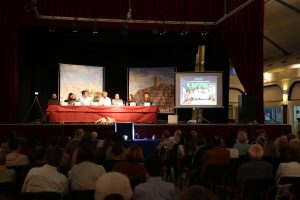 During the presentation, which was attended by over 100 people, was organised an exhibition of photos and 3D photos by local photographers focused on the activity carried on last July in Mojacar. The ceremony included also a flamenco show . The presentation was retransmitted by the youtube channel of the Town Hall.
During the presentation, which was attended by over 100 people, was organised an exhibition of photos and 3D photos by local photographers focused on the activity carried on last July in Mojacar. The ceremony included also a flamenco show . The presentation was retransmitted by the youtube channel of the Town Hall.
- 18 October 2018, Madrid (Spain). UGR at the Master's degree "Cultural Heritage in the 21st Century: Management and Research from Complutum University in Madrid"
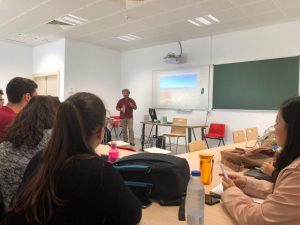 Prof. Jose María Martín Civantos talked about Innovation and research in the cultural Heritage.
Prof. Jose María Martín Civantos talked about Innovation and research in the cultural Heritage.
- 18 October 2018, Madrid (Spain). UGR at the Master's degree "Cultural Heritage in the 21st Century: Management and Research from Complutum University in Madrid"
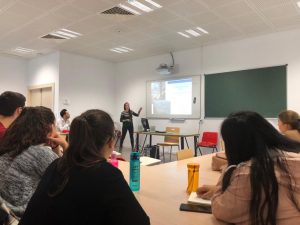 Dr. Lara Delgado Anés talked about Community Archaeology , Participatory archaeology applied to Cultural Landscape.
Dr. Lara Delgado Anés talked about Community Archaeology , Participatory archaeology applied to Cultural Landscape.
- 3-6 October 2018, Provence (France).
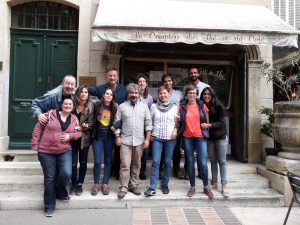 Prof. José María Martín Civantos and Dr. Lara Delgado Anés (UGR University of Granada) with the members of Regional Park, worked on the proposal about activities or intervention in the field of rural heritage focused on local communities.
Prof. José María Martín Civantos and Dr. Lara Delgado Anés (UGR University of Granada) with the members of Regional Park, worked on the proposal about activities or intervention in the field of rural heritage focused on local communities.
- 7 June 2018 Forum with the congressman Juanxto López de Uralde (UnidosPodemos).
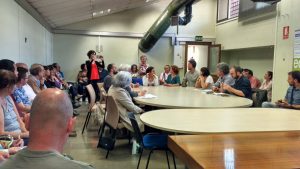 The University of Granada presented the matters related to the modernisation of the Historical and Traditional Irrigation Systems. In this forum participated 19 platforms and associations. They presented the social, cultural and environmental problems addressing Granada town.
The University of Granada presented the matters related to the modernisation of the Historical and Traditional Irrigation Systems. In this forum participated 19 platforms and associations. They presented the social, cultural and environmental problems addressing Granada town.
- 17-27 May 2018, Granada (Spain). "Darro River Valley" Programme
The 27th of 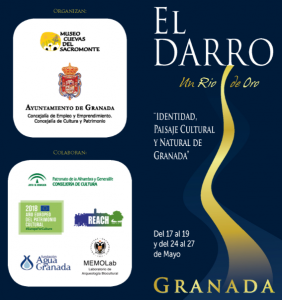 May, the MEMOLab laboratory of the University of Granada ran the cleaning and the put in use of the historical irrigation channel of Romayla.
May, the MEMOLab laboratory of the University of Granada ran the cleaning and the put in use of the historical irrigation channel of Romayla.
The initiative was organized in collaboration with the Museum of Cuevas Del Sacromonte, the Municipality of Granada,The Council of Alhambra and Generalife and it wass part of the rich programme of round tables and events that were held from 17th to 27th of May, focus on the promotion and enhance of the valley of Darro, one of the most original landscape of the town and province. Read more,
Further information: Poster of the initiative, Programme.
- 27 May 2018, Granada (Spain).
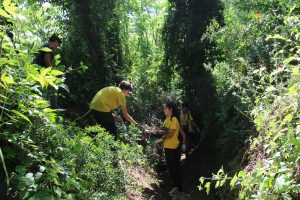 Cleaning of the Romayla irrigation channel (Granada) with the irrigators community and with the help of 35 volunteers and with the collaboration Alhambra and Generalife Council, "Cuevas Sacromonte" Museum, Granada City Council and Agua Granada Foundation. In this activity participated 23 volunteers and 10 Christian Scouts.
Cleaning of the Romayla irrigation channel (Granada) with the irrigators community and with the help of 35 volunteers and with the collaboration Alhambra and Generalife Council, "Cuevas Sacromonte" Museum, Granada City Council and Agua Granada Foundation. In this activity participated 23 volunteers and 10 Christian Scouts.
- 19-20 May 2018, Jérez del Marquesado, Granada (Spain).
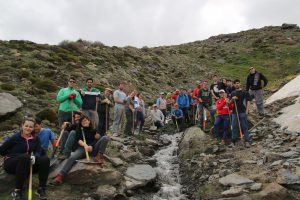 Recovery and put in use the "Cabañuela" High Mountain Irrigation Channel (1,7km) in Jérez Del Marquesado with 10 members from the Local Irrigator Community and with the collaboration of the Town Hall and the National & Natural Park of Sierra Nevada. This irrigation channel was abandoned 15 years ago. In this activity has participated 30 volunteers and 5 members from the "Barranco Alcázar" trekking Association. The volunteers were from Spain, India, China, Colombia, Nicaragua, Brazil, Belgium.
Recovery and put in use the "Cabañuela" High Mountain Irrigation Channel (1,7km) in Jérez Del Marquesado with 10 members from the Local Irrigator Community and with the collaboration of the Town Hall and the National & Natural Park of Sierra Nevada. This irrigation channel was abandoned 15 years ago. In this activity has participated 30 volunteers and 5 members from the "Barranco Alcázar" trekking Association. The volunteers were from Spain, India, China, Colombia, Nicaragua, Brazil, Belgium.
- 5 May 2018, Lugros, Granada (Spain). Cleaning day of historical irrigation channels.
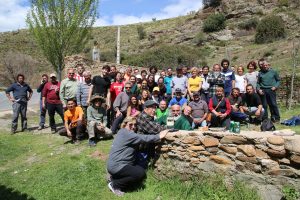 MEMOLab laboratory of the University of Granada in cooperation with the Town Hall of Lugros and the national and Natural Park of Sierra Nevada, organized a cleaning day of the high mountain historical irrigation channels. The initiative took place in the small municipality of Lugros and in the neighboring irrigators communities of Guadix and Graena. Read more.
MEMOLab laboratory of the University of Granada in cooperation with the Town Hall of Lugros and the national and Natural Park of Sierra Nevada, organized a cleaning day of the high mountain historical irrigation channels. The initiative took place in the small municipality of Lugros and in the neighboring irrigators communities of Guadix and Graena. Read more.
Look the video
- 27-29 April 2018, Granada (Spain). Workshop on communal management of the rural areas in Spain.
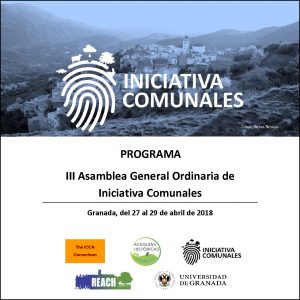
MEMOLab Laboratory from the University of Granada collaborated in the organization of the General Assembly of Communal initiatives.
The objective was to promote the good coexistence of the neighbours, an equitable use of resources and to ensure their good status for future generations.
Different stakeholders shared their own experiences in Spain about communal management of the rural areas. Read more here. Further information: poster of the event, programme of the event.
7-8 April 2018, Barranco del Poqueira, Alpujarra (Spain)
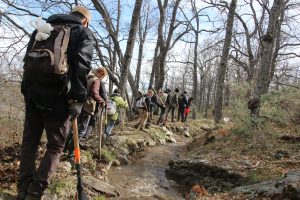 Cleaning of the "Nueva" historical irrigation channel with 16 Irrigators community and with the help of 50 volunteers. This participatory activity were organised in collaboration with "Plataforma por la recuperación del paisaje agro´ganadero del Barranco del Poquiera" Association. The volunteers came from Spain, France, Italy, UK, Turkey, Argentina, Chile and Australia.
Cleaning of the "Nueva" historical irrigation channel with 16 Irrigators community and with the help of 50 volunteers. This participatory activity were organised in collaboration with "Plataforma por la recuperación del paisaje agro´ganadero del Barranco del Poquiera" Association. The volunteers came from Spain, France, Italy, UK, Turkey, Argentina, Chile and Australia.
- 17 February 2018, Cáñar, Granada (Spain). Annual cleaning of the medieval irrigation channel of Barjas.
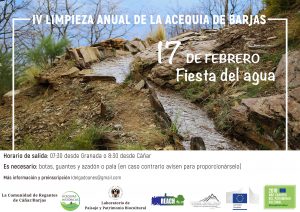
The University of Granada, in cooperation with the local irrigators community, organised the annual cleaning of the medieval irrigation channel of Barjas and of the branch La Hijuela.Read the chronicle of the event here. Further information:
Poster of the event

